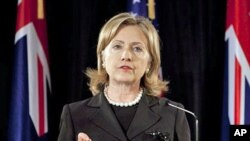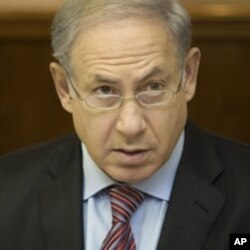Secretary of State Hillary Clinton will meet Israeli Prime Minister Benjamin Netanyahu early next week as part of a stepped-up U.S. effort to break the stalemate in Israeli-Palestinian peace talks. Clinton says she thinks the process can be put back on track.
Officials here say Clinton will meet the Israeli leader next week in either Washington or New York as efforts to renew the direct peace talks accelerate after the U.S. election.
The Israeli leader is in the United States for meetings with U.S. Jewish leaders, while Clinton is traveling in the Asia-Pacific region and is not due back until late Monday.
The U.S. brokered peace talks broke down last month with Israel unwilling to extend a freeze on most West Bank settlement activity, and the Palestinians saying they would not return to the talks without an extension.
In comments in Wellington, New Zealand, Clinton confirmed plans to meet Mr. Netanyahu and said she is convinced that both he and Palestinian President Mahmoud Abbas are committed to pursuing a two state solution to the conflict.
She gave no indication how the current impasse might be resolved but said she believes, in her words, that we will be able to do so.
U.S. Middle East envoy George Mitchell, who will join in the Clinton-Netanyahu meeting next week, met at the State Department Thursday with Palestinian chief negotiator Saeb Erekat.
Erakat, in comments to Washington reporters, said in the absence of peace talks, the Palestinians might seek support in the United Nations for an independence declaration.
That drew a rejoinder from State Department Spokesman P.J. Crowley, who reiterated the U.S. view than an dependence move without Israeli concurrence will not advance the peace process.
"We want to see the parties in a direct negotiation. We have made clear all along that unilateral steps, either by the Israelis or the Palestinians undermine the direct negotiation which is the only way in which to resolve the core issues, reach an agreement, and end the conflict," said Crowley.
Erekat told a Washington research group a Palestinian independence move would be no different from that of Kosovo in 2008, which was recognized by the United States and some 70 other countries.
A senior State Department official said the Kosovo declaration capped intensive diplomatic work over many years, and reflected a judgment that it was the only remaining step available given the refusal of Serbia to accept separation by its former province.
The official said in the case of the Israeli-Palestinian conflict, there is already broad understanding on the parameters of an agreement, and that U.S. officials believe success is achievable in a reasonable time frame.
Palestinian negotiator Erekat met here Wednesday with Assistant Secretary of State for Near Eastern Affairs Jeffrey Feltman.
Israeli negotiator Isaac Molcho had a similar round of meetings with U.S. officials last week.





